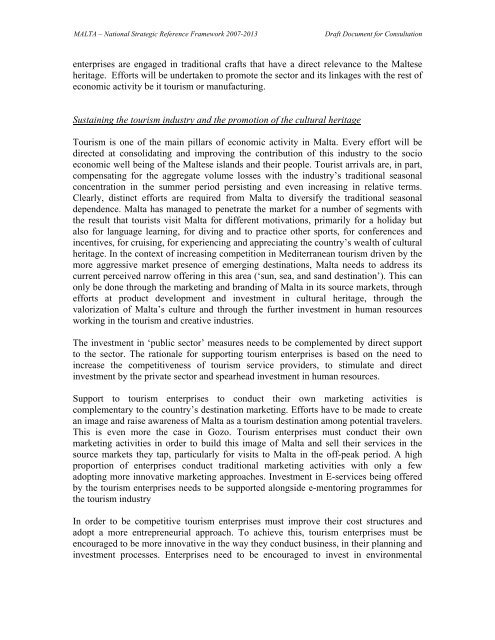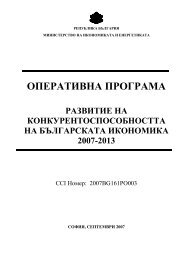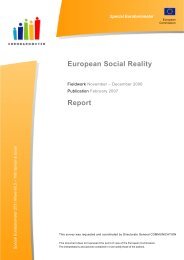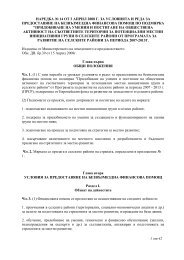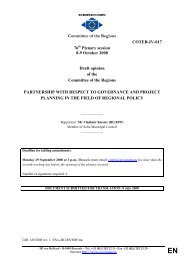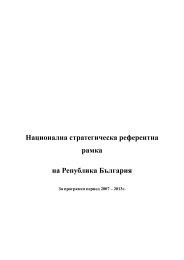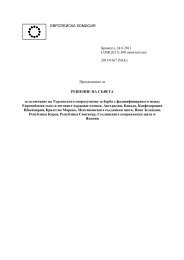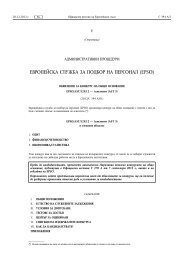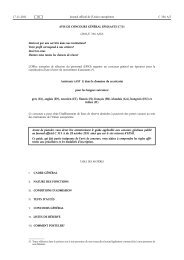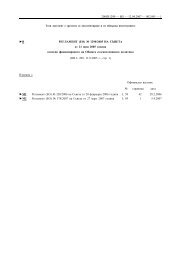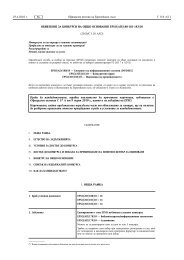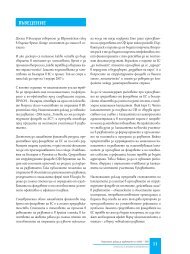National Strategic Reference Framework
National Strategic Reference Framework
National Strategic Reference Framework
Create successful ePaper yourself
Turn your PDF publications into a flip-book with our unique Google optimized e-Paper software.
MALTA – <strong>National</strong> <strong>Strategic</strong> <strong>Reference</strong> <strong>Framework</strong> 2007-2013 Draft Document for Consultation<br />
enterprises are engaged in traditional crafts that have a direct relevance to the Maltese<br />
heritage. Efforts will be undertaken to promote the sector and its linkages with the rest of<br />
economic activity be it tourism or manufacturing.<br />
Sustaining the tourism industry and the promotion of the cultural heritage<br />
Tourism is one of the main pillars of economic activity in Malta. Every effort will be<br />
directed at consolidating and improving the contribution of this industry to the socio<br />
economic well being of the Maltese islands and their people. Tourist arrivals are, in part,<br />
compensating for the aggregate volume losses with the industry’s traditional seasonal<br />
concentration in the summer period persisting and even increasing in relative terms.<br />
Clearly, distinct efforts are required from Malta to diversify the traditional seasonal<br />
dependence. Malta has managed to penetrate the market for a number of segments with<br />
the result that tourists visit Malta for different motivations, primarily for a holiday but<br />
also for language learning, for diving and to practice other sports, for conferences and<br />
incentives, for cruising, for experiencing and appreciating the country’s wealth of cultural<br />
heritage. In the context of increasing competition in Mediterranean tourism driven by the<br />
more aggressive market presence of emerging destinations, Malta needs to address its<br />
current perceived narrow offering in this area (‘sun, sea, and sand destination’). This can<br />
only be done through the marketing and branding of Malta in its source markets, through<br />
efforts at product development and investment in cultural heritage, through the<br />
valorization of Malta’s culture and through the further investment in human resources<br />
working in the tourism and creative industries.<br />
The investment in ‘public sector’ measures needs to be complemented by direct support<br />
to the sector. The rationale for supporting tourism enterprises is based on the need to<br />
increase the competitiveness of tourism service providers, to stimulate and direct<br />
investment by the private sector and spearhead investment in human resources.<br />
Support to tourism enterprises to conduct their own marketing activities is<br />
complementary to the country’s destination marketing. Efforts have to be made to create<br />
an image and raise awareness of Malta as a tourism destination among potential travelers.<br />
This is even more the case in Gozo. Tourism enterprises must conduct their own<br />
marketing activities in order to build this image of Malta and sell their services in the<br />
source markets they tap, particularly for visits to Malta in the off-peak period. A high<br />
proportion of enterprises conduct traditional marketing activities with only a few<br />
adopting more innovative marketing approaches. Investment in E-services being offered<br />
by the tourism enterprises needs to be supported alongside e-mentoring programmes for<br />
the tourism industry<br />
In order to be competitive tourism enterprises must improve their cost structures and<br />
adopt a more entrepreneurial approach. To achieve this, tourism enterprises must be<br />
encouraged to be more innovative in the way they conduct business, in their planning and<br />
investment processes. Enterprises need to be encouraged to invest in environmental


